News Headlines
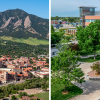 The AB Nexus Research Collaboration Grant program announced its inaugural round of grants totaling $625K for novel research projects integrating expertise from the CU Anschutz and Boulder campuses. The projects involve a broad range of research themes related to basic science and translational approaches.
The AB Nexus Research Collaboration Grant program announced its inaugural round of grants totaling $625K for novel research projects integrating expertise from the CU Anschutz and Boulder campuses. The projects involve a broad range of research themes related to basic science and translational approaches.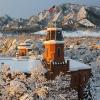 We continue to ask employees and researchers who are not already approved for on-campus or field work to continue remote work until instructed otherwise. Anyone performing work that has been approved should follow all CU Boulder, Boulder County and Colorado guidance.
We continue to ask employees and researchers who are not already approved for on-campus or field work to continue remote work until instructed otherwise. Anyone performing work that has been approved should follow all CU Boulder, Boulder County and Colorado guidance.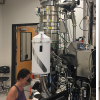 Capable of achieving spatial resolutions of 70 pm—smaller than the size of an atom—the Thermo Scientific Titan Themis S/TEM, located in the newly-launched CU Facility for Electron Microscopy of Materials (CU FEMM), is now the highest-resolution electron microscope in Colorado.
Capable of achieving spatial resolutions of 70 pm—smaller than the size of an atom—the Thermo Scientific Titan Themis S/TEM, located in the newly-launched CU Facility for Electron Microscopy of Materials (CU FEMM), is now the highest-resolution electron microscope in Colorado.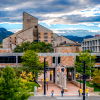 The College of Engineering and Applied Science launched three new interdisciplinary research themes this summer as part of a broad push into critical areas of study. Join a virtual session on Wednesday, Nov. 4 from 1–3 p.m. to meet the IRT directors, hear their plans and learn how you can participate.
The College of Engineering and Applied Science launched three new interdisciplinary research themes this summer as part of a broad push into critical areas of study. Join a virtual session on Wednesday, Nov. 4 from 1–3 p.m. to meet the IRT directors, hear their plans and learn how you can participate.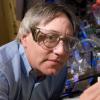 Noted organic chemist Seth Marder has been named the new director of the Renewable and Sustainable Energy Institute (RASEI), one of several affiliated with CU Boulder, effective July 2021. RASEI is a joint institute between CU Boulder and the U.S. Department of Energy’s National Renewable Energy Laboratory (NREL).
Noted organic chemist Seth Marder has been named the new director of the Renewable and Sustainable Energy Institute (RASEI), one of several affiliated with CU Boulder, effective July 2021. RASEI is a joint institute between CU Boulder and the U.S. Department of Energy’s National Renewable Energy Laboratory (NREL). CU Boulder research attracted $613.9 million in funding in fiscal year 2020 for groundbreaking studies that, among other things, crack the code of the teenage brain, advance electric transportation and aim to understand how odors guide behavior.
CU Boulder research attracted $613.9 million in funding in fiscal year 2020 for groundbreaking studies that, among other things, crack the code of the teenage brain, advance electric transportation and aim to understand how odors guide behavior.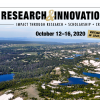 The Research & Innovation Office (RIO) invites students, faculty, staff and the community to join Research & Innovation Week, Oct. 12–16. The 2020 streamlined edition will feature three virtual events that you’ll only be able to find at CU Boulder.
The Research & Innovation Office (RIO) invites students, faculty, staff and the community to join Research & Innovation Week, Oct. 12–16. The 2020 streamlined edition will feature three virtual events that you’ll only be able to find at CU Boulder.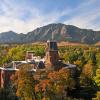 The University of Colorado Boulder and the SRI Foundation will jointly establish a Center for Collaborative Synthesis in Archaeology (CCSA) to advance “scientific understandings of the human past and solutions to contemporary social challenges.”
The University of Colorado Boulder and the SRI Foundation will jointly establish a Center for Collaborative Synthesis in Archaeology (CCSA) to advance “scientific understandings of the human past and solutions to contemporary social challenges.”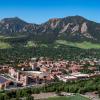 Chancellor DiStefano has announced the change to our instructional mode to all remote, effective with the start of classes on Sept. 23. This change to remote instruction is our best effort to keep our students and our community safe and bring down the rate of infection during the voluntary self-quarantine. On-campus research will continue and is not affected by this shift to remote instruction, and staff will continue to work on campus as currently assigned.
Chancellor DiStefano has announced the change to our instructional mode to all remote, effective with the start of classes on Sept. 23. This change to remote instruction is our best effort to keep our students and our community safe and bring down the rate of infection during the voluntary self-quarantine. On-campus research will continue and is not affected by this shift to remote instruction, and staff will continue to work on campus as currently assigned.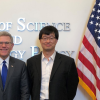 The White House Office of Science and Technology Policy and the U.S. Department of Energy have announced that JILA and CU Boulder’s Jun Ye will be one of the members of the National Quantum Initiative Advisory Committee (NQIAC).
The White House Office of Science and Technology Policy and the U.S. Department of Energy have announced that JILA and CU Boulder’s Jun Ye will be one of the members of the National Quantum Initiative Advisory Committee (NQIAC).

